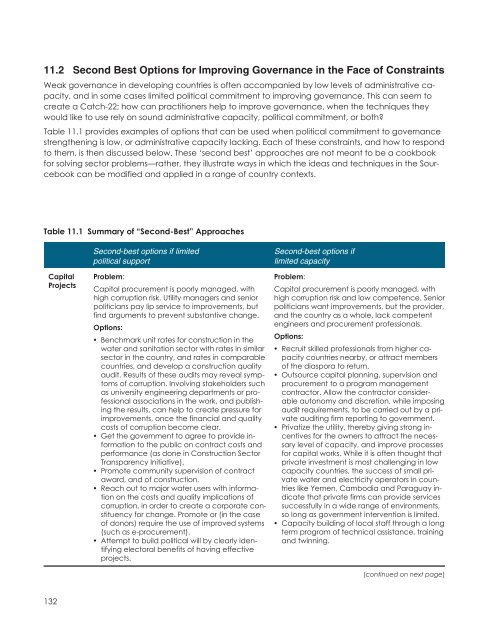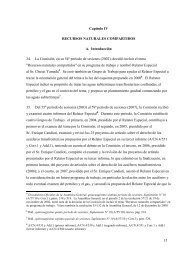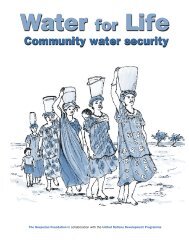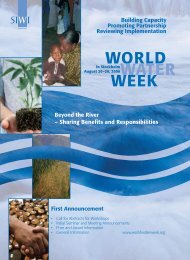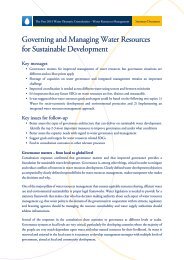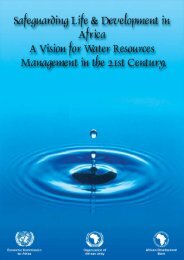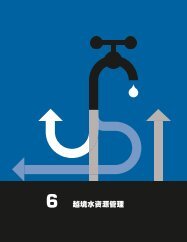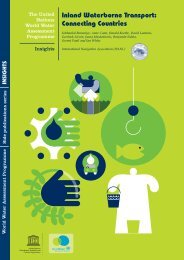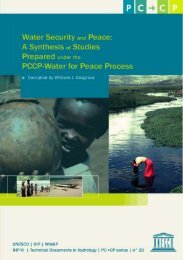A Sourcebook - UN-Water
A Sourcebook - UN-Water
A Sourcebook - UN-Water
You also want an ePaper? Increase the reach of your titles
YUMPU automatically turns print PDFs into web optimized ePapers that Google loves.
11.2 Second Best Options for Improving Governance in the Face of Constraints<br />
Weak governance in developing countries is often accompanied by low levels of administrative capacity,<br />
and in some cases limited political commitment to improving governance. This can seem to<br />
create a Catch-22; how can practitioners help to improve governance, when the techniques they<br />
would like to use rely on sound administrative capacity, political commitment, or both?<br />
Table 11.1 provides examples of options that can be used when political commitment to governance<br />
strengthening is low, or administrative capacity lacking. Each of these constraints, and how to respond<br />
to them, is then discussed below. These ‘second best’ approaches are not meant to be a cookbook<br />
for solving sector problems—rather, they illustrate ways in which the ideas and techniques in the <strong>Sourcebook</strong><br />
can be modified and applied in a range of country contexts.<br />
Table 11.1 Summary of “Second-Best” Approaches<br />
Capital<br />
Projects<br />
Second-best options if limited<br />
political support<br />
Problem:<br />
Capital procurement is poorly managed, with<br />
high corruption risk. Utility managers and senior<br />
politicians pay lip service to improvements, but<br />
find arguments to prevent substantive change.<br />
Options:<br />
• Benchmark unit rates for construction in the<br />
water and sanitation sector with rates in similar<br />
sector in the country, and rates in comparable<br />
countries, and develop a construction quality<br />
audit. Results of these audits may reveal symptoms<br />
of corruption. Involving stakeholders such<br />
as university engineering departments or professional<br />
associations in the work, and publishing<br />
the results, can help to create pressure for<br />
improvements, once the financial and quality<br />
costs of corruption become clear.<br />
• Get the government to agree to provide information<br />
to the public on contract costs and<br />
performance (as done in Construction Sector<br />
Transparency Initiative).<br />
• Promote community supervision of contract<br />
award, and of construction.<br />
• Reach out to major water users with information<br />
on the costs and quality implications of<br />
corruption, in order to create a corporate constituency<br />
for change. Promote or (in the case<br />
of donors) require the use of improved systems<br />
(such as e-procurement).<br />
• Attempt to build political will by clearly identifying<br />
electoral benefits of having effective<br />
projects.<br />
Second-best options if<br />
limited capacity<br />
Problem:<br />
Capital procurement is poorly managed, with<br />
high corruption risk and low competence. Senior<br />
politicians want improvements, but the provider,<br />
and the country as a whole, lack competent<br />
engineers and procurement professionals.<br />
Options:<br />
• Recruit skilled professionals from higher capacity<br />
countries nearby, or attract members<br />
of the diaspora to return.<br />
• Outsource capital planning, supervision and<br />
procurement to a program management<br />
contractor. Allow the contractor considerable<br />
autonomy and discretion, while imposing<br />
audit requirements, to be carried out by a private<br />
auditing firm reporting to government.<br />
• Privatize the utility, thereby giving strong incentives<br />
for the owners to attract the necessary<br />
level of capacity, and improve processes<br />
for capital works. While it is often thought that<br />
private investment is most challenging in low<br />
capacity countries, the success of small private<br />
water and electricity operators in countries<br />
like Yemen, Cambodia and Paraguay indicate<br />
that private firms can provide services<br />
successfully in a wide range of environments,<br />
so long as government intervention is limited.<br />
• Capacity building of local staff through a long<br />
term program of technical assistance, training<br />
and twinning.<br />
(continued on next page)<br />
132


